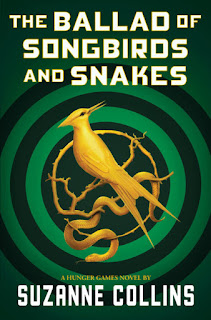So I don't want to accidentally give away too much, which limits what I can talk about. I'd love to get into whether or not Snow is inherently the Snow we meet later on, or if it's someone he becomes through trauma. I have a distinct opinion after finishing the book -- sharing it will spoil everything though. Suffice it to say, he's nothing if not complex and highly intelligent.
This prequel to The Hunger Games Series takes place during the 10th Hunger Games. The games are still coming into their own, so this event is missing all the showmanship and flash we see when Katniss enters the arena. High school students have been tasked to act as mentors for the tributes for the first time, Snow among the chosen.
The Capitol is a different place too. Still reeling from the war, the district is in a state of reconstruction. As a result, poverty appears in unlikely places, namely Snow's apartment. A once prominent family, their money troubles are about to get the best of them. Reputation is all they have, and it's also on the line when Snow is assigned the female tribute from District 12 to mentor. He needs a win, but the odds aren't good. Fortunately, there's more than meets the eye when it comes to his tribute, Lucy Gray. She's highly intuitive and resourceful both inside and outside the arena. You can't help but root for her.
The Hunger Games themselves are narrated through Snow's perspective. You don't know everything that goes on in the arena, or among the tributes. In fact, the actual event plays a small role in the story. What goes on outside the arena is more important. It's what makes this Hunger Games unique. Before, during, and after, events occur that allow Snow to really solidify how he feels about it all. How he feels about people, Panem, family, duty, and love. You could even say that this single year in Snow's life is his character-defining year, and he's still just a teenager.
This self-discovery does turn him into the terror we meet through Katniss, but how far off is he here from who he becomes later?
This prequel is an exciting story that felt very different from the original trilogy. You get insight into the vile character we'd already seen, but as his origin story. I wish I could say more, but I really enjoyed this book and recommend it. Just read the original trilogy first.
Overall, this was a really unique conclusion for a dystopian YA series. Rather than have her heroine overcome some huge obstacle to discover the worldly corruption being hidden from society, Condie lets Cassia learn a simple, universal, life lesson. Of course, it's brought to her as society crumbles under a deadly plague that the Rising is trying to cure. Basically, there's no loss of action or urgency even with a more ambiguous ending.
This third book finally presents a scenario where Cassia, Ky, and Xander can be with each other. They've intertwined as a functioning love triangle where their friendships with each other overshadow the awkwardness of mismatched love. They come together to literally save the world. A plague everyone thought was under control has mutated and a cure must be found. Cassia, the sorter, can calculate outcomes with data. She can see how long before the mutated plague does significant damage. She can guess at potential cures through a subset of the community that is immune. Xander, the medic, can build and administer a cure once its compounds are known. Ky, unfortunately, serves as the test subject in this struggle. He eventually falls ill to the plague. Each of the characters though are integral to the process, not only for the job they take on but for the emotional motivation they provide for each other. Solving this puzzle is personal.
These books read really fast. Condie doles out new bits to the plot at just the right face to fully engage the reader, and her unique angle to dystopia keeps it interesting. I really appreciated that through all the action, the three main characters still remain anonymous to the larger community. They don't become emblems of salvation for either side in this battle, they just work at what they do best to save the world so everyone can then work to bring the community back together in the right way (the way that works best for everyone.) The big win here is that each individual gets back the right to choose - a worth cause to fight for in any instance.

